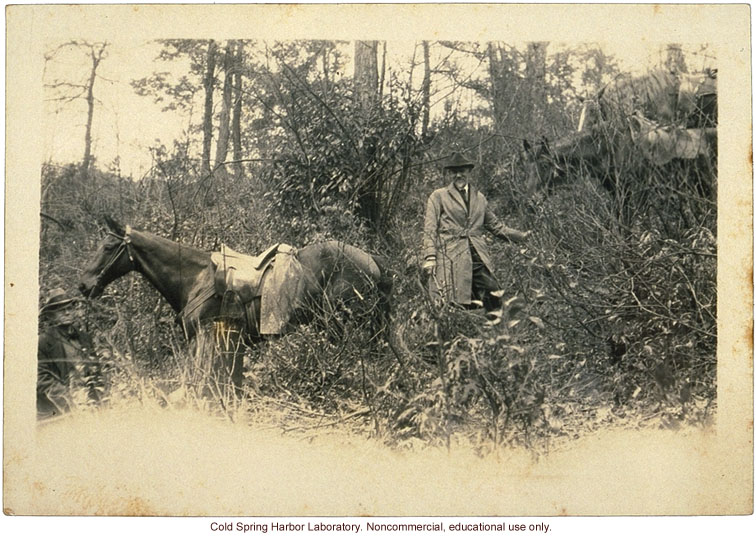Kentucky
Number
of victims
There
were no victims, as Kentucky did not have a eugenic sterilization law.
Passage
of law(s)
While
no eugenic sterilization law existed, in the late 1920s a bill for
eugenic
sterilization was passed in the House but not the Senate after adoption
of a eugenic sterilization law had been recommended by the Kentucky
Board of Charities and Corrections (Noll, p. 77).
Precipitating
factors and processes
In
1860, the State Institute for the Feeble-Minded in Frankfort opened,
which made
it one of the earliest such institutions in the entire South (see Noll,
pp. 12,
161 n. 22), but it provided only custodial care for a small number of
inmates
and eventually became overcrowded (Noll, p. 23).
In the late 1910s and early 1920s Kentucky was of interest to eugenicists. Charles Davenport conducted studies there (see picture); Kentucky was were included in Arthur Estabrook’s “Tribe of Ishmael” study; and in 1922 repealed its Pauper Idiot Pension Law, which had law authorized payments of seventy-five dollars per year to the families of poor and feeble-minded individuals in the community (Noll, p. 23). It was also one of the states in which the National Committee for Mental Hygiene conducted its survey regarding "feeble-mindedness" (Noll, p. 16).
 (Photo origin:
Eugenic Archives, available at
http://www.eugenicsarchive.org/html/eugenics/static/images/1679.html)
(Photo origin:
Eugenic Archives, available at
http://www.eugenicsarchive.org/html/eugenics/static/images/1679.html)
A statute from 1934 referenced the need for sterilization based upon the propogation of the "socially inadequate" that was occuring and that would ultimately lead to "race suicide." Skinner, the author, said that this problem was easily fixed via a simple and "harmless" operation that was actually to the benefit of the patient, who did not have, in Skinner's opinion, the capacity to rear children, anyway (Skinner, p. 168).
The Eugenics movement has also, recently, been analyzed in conjunction with the birth control movement (Meyer). The rise of birth control also came about as a result of science and had an effect on women. In the 1920's, religious groups attacked birth control, a movement that was fought by eugenicists and feminists, among others. Eugenics was used to support the birth control movement and its potential to restrict the reproduction of the "unfit" (Meyers, pp. 66-70). For example, Clarence Gamble, a physician and an advocate for birth control, supported the movement "not from a belief that women should have reproductive control, but from his desire to reduce the reproduction of the poor" (Meyers, p. 71). Interestingly, the Kentucky State Department of Health did not adopt birth control as an institutionalized service until 1966, though a movement to make that happen began in 1933. Despite that, there was a eugenicist presence in Kentucky. Advocates for birth control used the slogan "Fewer Babies, Better Babies" and received support from eugenicists such as Clarence Gamble (Meyers, pp. 71-74).
Other restrictions on people with disabilities
General
concerns about marriage and feeblemindedness became
apparent in 1913 at the Protestant Episcopal General Convention. It was there that the Kentucky
Diocesan
Convention reported that it had drafted and passed the resolutions that
required health certificates to be presented before people could get
married
(Rosen, p. 63). The
idea of so called
“eugenic marriage legislation” looked appealing in the early 1910s, but
the Health Certificate legislation ultimately failed (Rosen,
p. 69).
Opposition
A
eugenics organizer credited Catholic groups in Kentucky with having
helped to stall a eugenic sterilization law (Rosen, p. 145).
Bibliography
Estabrook, Arthur H. 1923. "The Tribe of Ishmael." In Eugenics, Genetics and the Family, vol. 1. Baltimore: Williams & Wilkins Co.
Meyers, Judith Gay. 2005. A Socio-Historical Analysis of the Kentucky Birth Control Movement 1933-1943. Louisville, KY: University of Kentucky.
Noll,
Steven. 1995. Feeble-Minded
in Our Midst: Institutions for the
Mentally Retarded in the South, 1900-1940.
Chapel Hill: University of North Carolina Press.
Paul,
Julius. 1965. "'Three Generations of Imbeciles Are
Enough': State Eugenic Sterilization Laws in American Thought and
Practice." Washington, D.C.: Walter Reed Army Institute of Research.
Rosen, Christine. 2004. Preaching Eugenics: Religious Leaders and the American Eugenics Movement. Oxford: Oxford University Press.
Skinner, George T. 1934-1935. Sterlization Statute for Kentucky. 23 Ky. L.J. 168. Excerpt available here: HeinOnline